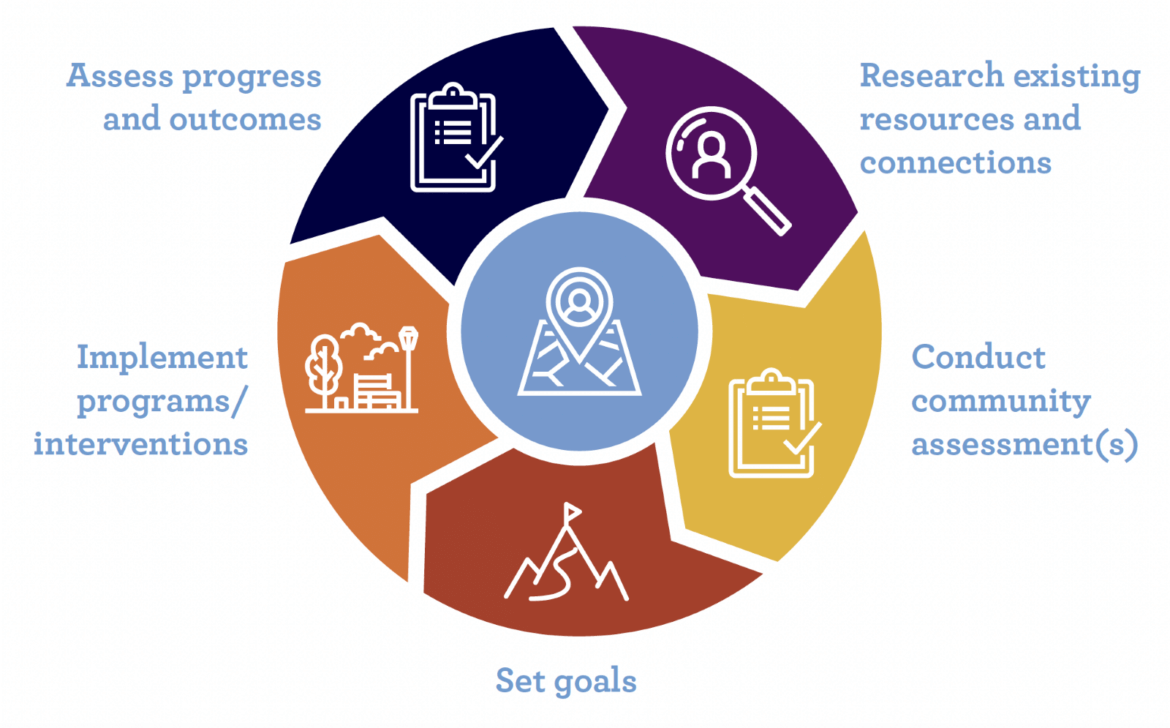Mid-Year Reflections
Summer is upon us! At this mid-year point, we’d like to provide a resource roundup focused on reflection to provide the support that might help guide your Parkinson’s community action for the rest of the year – whether you are a CAC leader, Ambassador, and/or local community leader. Midyear is a great time to reflect on how far you’ve come and what you’ve accomplished and highlight opportunities to leverage the wins you’ve had. Reflection is a fundamental tool that helps to maximize the learning cycle, which we know from the research. Through reflection, we can highlight key learning points and apply these findings to future situations. Therefore, this roundup provides a synopsis of the Healthy Parkinson’s Communities’ (HPC) Network program cycle and how this model can facilitate reflection throughout each step. In addition, we offer an assortment of toolkits, online articles, and more on this theme.
The HPC Cycle
The Healthy Parkinson’s Communities’ (HPC) Community Action Committee (CAC) Network model was adapted for the Parkinson’s community from collective action or community organizing evidence-based research, as well as existing community-led efforts (i.e., organizations, nonprofits, etc.). The cycle below is based on community action and guides the Healthy Parkinson’s Communities (HPC) Toolkit for our CACs.

Community-led efforts are cyclical, where a community undergoes several iterations that gradually transform to help improve the outcomes of interest we set out to impact. And this may align with the year or on a different financial calendar, though the information is still applicable. Therefore, wherever you are in the process, it is helpful to stop and reflect on the progress made and assess needs that have changed. Regardless of where you are in the cycle, these themes overlap, and the cycle takes on more structure and improvements. In each of the cycle’s steps, there are questions that we can pause to reflect on to identify places where our work could otherwise be flourishing.
How to Identify Problem Areas
- Getting started with coalition efforts
- What is the local effort “WHY?”- mission
- Who is leading this work (for the local community effort)?
- What does this structure look like?
- Who is the point person/people?
- How does the local community communicate about efforts?
- Where to physically/digitally store information
- Meeting logistics
- Research existing resources and connections
- What resources or connections exist within the community?
- How can we leverage efforts and resources to not duplicate work?
- How do we maintain these relationships?
- What does communication look like?
- What resources/partners/skills are missing in the community?
- How can we support these resources or share our resources?
- What resources or connections exist within the community?
- Conduct community assessments
- What information would help us reach our goals?
- What data resources are available to us?
- How/can we work with student volunteers to do projects?
- Set goals
- How are our goals measured? The outcome?
- Are we on track to meet our goals at the end of the year?
- Are there insights on what goals would be beneficial in the next year?
- Implement programs/interventions
- To reach our goals and make an impact, what do we need?
- What does the timeline look like? Who will do what actions?
- What are the communication plans?
- Assess progress and outcomes
- What went well/is going well?
- What can be improved for future efforts?
- How can we make processes more efficient and make replicating the work easier?
Resources and Articles to Read on Reflection
The following articles provide an overview of reflective practice and its relation to group processes in coalition-led work.
Reflective Practice: Thinking About the Way You Do Things
The article provides a broad overview of reflection, its benefits, the types of reflection, the processes involved, and examples of how this is applicable in group settings.
The article provides a list of reflection activities that you can implement in either individual or group settings. These can be a launching point for ideas that you may want to apply.
Tools and Toolkits on Reflection
The following are toolkits and training modules on reflection that may be helpful to use within your community.
Getting Started with Reflective Practice
Cambridge International Education’s tool provides a module overview of reflective practice, emphasizing psychological connections to learning and research. It is useful in educational and community settings.
The University of Nottingham’s module, Introducing Action Research, offers a research-focused perspective of reflection. Chapter 6 is particularly relevant to the HPC cycle.
CLA Toolkit: Facilitating Pause & Reflect
The US Agency of International Development has compiled a robust list of reflection activity summaries that may spark ideas.
A Guide to “Pause and Reflect” Pragmatic Advice for Practitioners
The toolkit provides an in-depth overview of how to facilitate conversations on reflection and provides a walk-through with examples of how to apply this in community settings.
Davis Phinney Foundation & HPC Blog Roundup
The following Foundation and HPC blog posts align with the following steps of the cycle as outlined:
- Getting started with coalition efforts
- The What, Why, and How of Community Action Committees (CACs)
- This previous HPC blog post introduced the CAC model and early steps in coalition-building for Parkinson’s.
- Healthy Parkinson’s Communities™ Resource Roundup: Introduction to Cross-Sector Collaboration and Healthy Communities
- This previous HPC blog post introduced cross-sector collaboration and how this can elevate your community work.
- The What, Why, and How of Community Action Committees (CACs)
- Research existing resources and connections
- HEALTHY PARKINSON’S COMMUNITIES™ RESOURCE ROUNDUP: Creating and Embracing Community Connections
- This previous HPC blog post introduces how to manage community connections and utilize strengths not to duplicate efforts but rather to leverage strengths.
- HEALTHY PARKINSON’S COMMUNITIES™ RESOURCE ROUNDUP: Creating and Embracing Community Connections
- Conduct community assessments
- Creating a Community Health Assessment for Parkinson’s
- This previous HPC blog post goes through the key pieces of community assessments to collect the information that can help assert your community needs, assets, and communicate to partners and potential funders.
- Turning Data into Action
- This previous HPC blog post goes through how to interpret data to communicate about community activities and actions.
- Creating a Community Health Assessment for Parkinson’s
- Set goals
- Setting Goals for a Healthy Parkinson’s Community
- This previous HPC blog post introduces goal setting in the context of establishing or working towards a Healthy Parkinson’s Community (HPC).
- Healthy Parkinson’s Communities™ Resource Roundup: How to Set Goals Based on Community Need
- This previous HPC blog post goes through the process of setting goals and determining how to prioritize goals to pursue.
- Setting Goals for a Healthy Parkinson’s Community
- Implement programs/interventions [EXAMPLES]
- Debbie is Advocating for People with Parkinson’s. You Can Too.
- This previous HPC blog post goes through one CAC Leader and Ambassador’s experience in advocacy work, partnering with a hospital system, and finding success.
- Jerry Boster Addresses Mental Health and Parkinson’s with Live Event
- This previous HPC blog post outlines one ambassador’s event on mental health as an educational event to promote awareness around Parkinson’s.
- Walk a Mile in My Parkinson’s Shoes with Lorraine Wilson
- This previous HPC blog post outcomes a CAC Leader and Ambassador’s experience in hosting an interactive and educational event to promote awareness around Parkinson’s and encourage empathy for persons with Parkinson’s.
- Parkinson’s Advocacy Through Community Organization
- This previous HPC blog post highlights advocacy as one route to highlight awareness around Parkinson’s and provides in-depth examples of how this has been successful.
- Debbie is Advocating for People with Parkinson’s. You Can Too.
- Assess progress and outcomes
- HEALTHY PARKINSON’S COMMUNITIES™ RESOURCE ROUNDUP: How to measure ongoing progress in your community
- This previous HPC blog post goes through a number of examples for defining community measurements and how community health is defined.
- HEALTHY PARKINSON’S COMMUNITIES™ RESOURCE ROUNDUP: How to measure ongoing progress in your community

